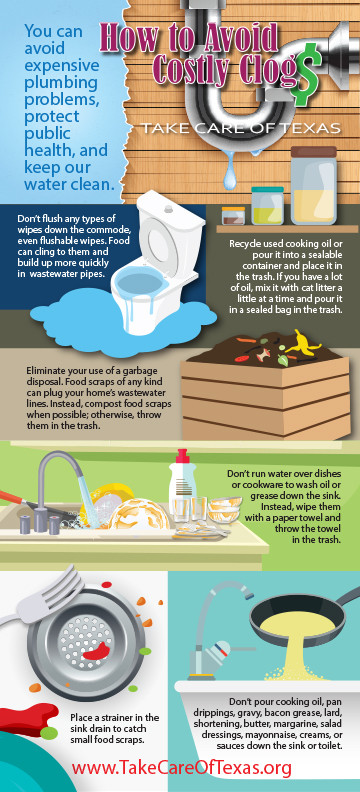Don’t Clog Up Your Fun: The Truth About Fats, Oils, and Grease (FOG)
Ever wonder where the leftover cooking oil goes after you fry some delicious food? Unfortunately, many people pour it down the drain, not realizing the problems it can cause. Fats, oils, and grease (FOG) are a major culprit behind clogged drains and sewer backups, leading to costly repairs and environmental issues.
Here at Fort Bend County MUD 47, we’re committed to keeping your home’s plumbing healthy and our community’s environment clean. That’s why we’re here to educate you on FOG and how to dispose of it properly.
The Problem with FOG
When you pour FOG down the drain, it cools and solidifies, clinging to the inside of your pipes. Over time, this build-up can cause:
- Slow drains: FOG clogs can make your sink, bathtub, and shower drain slowly.
- Sewer backups: If the clog gets bad enough, it can back up into your home, causing a messy and unsanitary situation.
- Environmental damage: FOG can overflow into storm drains and waterways, harming fish and wildlife.
The FOG Solution: Simple Steps for a Healthy Home and Happy Planet
Here’s the good news – avoiding these problems is easy! Just follow these simple tips for responsible FOG disposal:
- Scrape, don’t pour: Scrape excess grease, oil, and food scraps off your plates and pans before washing them. Compost the scraps if possible.
- Let it cool: Allow used cooking oil to cool completely before disposal. Never pour hot oil down the drain!
- Wipe it up: Wipe any remaining grease from pots and pans with a paper towel. Throw the paper towel in the trash.
- Collect and recycle: Save your used cooking oil in a container. Look for local restaurants or recycling centers that accept used cooking oil. You can even make biodiesel fuel from it!
Working Together for a Healthy System
By following these practices, you can help prevent costly plumbing problems for yourself and protect our community’s wastewater system. Remember, what you put down the drain doesn’t disappear – it affects everyone.
(more information available at https://www.sciencedirect.com/science/article/pii/S004896972305386X)
Learn More:
Looking for more information? Visit https://takecareoftexas.org/about-us/blog/dont-put-down-drain for additional tips on FOG disposal and other ways to keep your home’s plumbing healthy. Together, we can create a cleaner, healthier environment for everyone.
Did You Know?
The Fort Bend County Recycling Center provides a location for county-wide accessibility to residents for recycling of general home and home hazardous waste (HHW). The center is located at 1200 Blume Road, Rosenberg, TX 77471 and telephone number is (281)633-7581.
The Recycling Center accepts a long list of items from plastics to paper to oils to household appliances and more. On their website, instruction is given on how to present the materials and whether there is a fee related to the item.
Don’t pour that crawfish boil or fried turkey grease down the storm water drains! Used motor oil, paint, household chemicals, pesticides, pool chemicals, gasoline, and other hazardous waste are not to be disposed of in storm drains. This contaminates and pollutes our waterways and that affects us all.
If you are unsure of how to recycle or dispose of any chemicals, oils, greases, batteries, paints, household cleaners, fluorescent lighting bulbs (tubes), please visit their website or give them a call. Don’t endanger yourself and family, your household (and its plumbing), or your environment without investigating proper disposal of any item.
Looking for more information? Visit https://www.fortbendcountytx.gov/government/departments/county-services/recycling-center-hhw.

